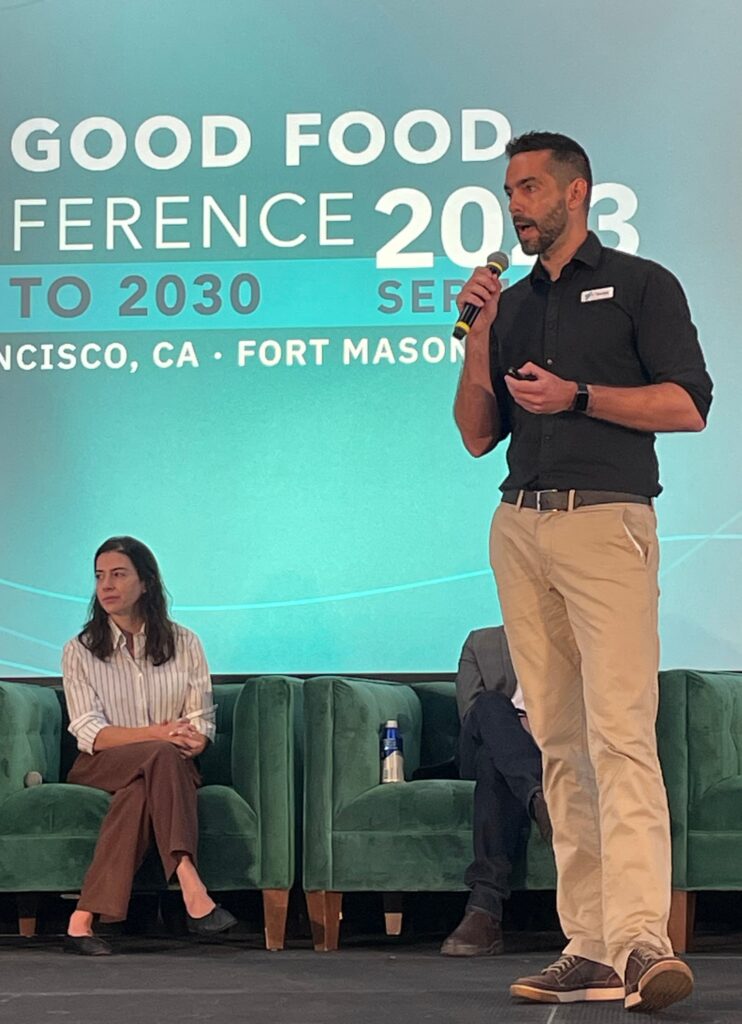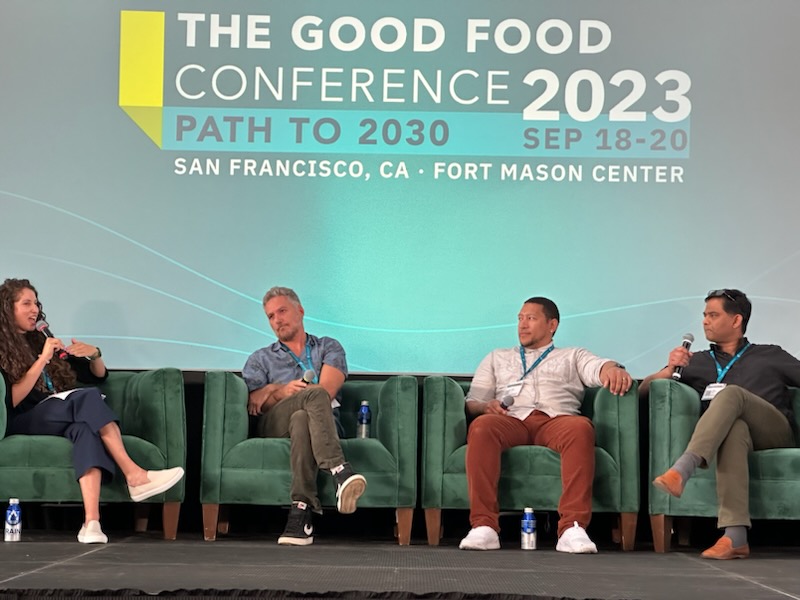Alternative proteins in food culture –chefs serve up wisdom at the Good Food Conference
27 September 2023
Last week’s Good Food Conference was a fantastic opportunity to take stock of how far the global plant-based, cultivated meat and fermentation sectors have grown. Read some key highlights from Carlotte in our corporate engagement team who was on the ground at the event.

Last week’s Good Food Conference was a fantastic opportunity to take stock of how far the global plant-based, cultivated meat and fermentation sectors have grown.
But, with the obstacles facing these sectors feeling more acute than ever, the Good Food Insitute’s flagship gathering was also a crucial reminder of how far we still need to go. And demonstrated the power of reaching beyond the alternative protein world to achieve mainstream consumer appeal.

GFI Europe’s Managing Director Alex Mayers and I made the journey to San Francisco’s Fort Mason Center, where we were joined by more than 900 fellow delegates including policymakers, researchers and private sector representatives – from tiny startups to some of the world’s biggest food companies – with another 250 joining virtually.
It was great to see so many European entrepreneurs and researchers – from Portugal to Finland – attending the conference to get inspired by others and pass on their own insights.
Europe plays a crucial role

Cultivated meat was born in Europe, and some of the most important alternative protein research continues to take place here, so it was telling that three out of the six startups showcasing their work at the conference’s Pitch Slam event were European.
These included Switzerland’s Cultivated Biosciences, developing a fat ingredient to solve textural challenges in plant-based dairy, and the UK’s Extracellular, which provides support services to help businesses scale up cultivated meat production. Deimena Drasutyte, GFI’s entrepreneur-in-residence and founder of HERlab, a UK startup using AI to optimise precision fermentation, also showcased the startup’s work during the session.
Alla Voldman of GFI Israel even used the conference to announce a joint call for collaborative R&D projects between Sweden, Switzerland, Israel and Singapore.
Chefs serve up advice to startups
But my personal stand out was the session on ‘bridging the gap between food tech and food culture’, where we heard from some of the most important players in the food system – chefs.
Their message about the importance of building alternative proteins into people’s food cultures is crucial to Europe, where national and regional identities are closely linked to the food we eat.

Nelson German, chef and owner of the alaMar and Sobre Mesa restaurants, spoke about his initial reservations about plant-based meat, and how he changed his perspective after adapting it to dishes his grandmother would have cooked.
Simplicity and familiarity were the message from chef Srijith Gopinathan, co-owner of the two Michelin starred Ettan restaurant and Chief Culinary Officer of Sempera Organics, who spoke about the importance of adding alternative proteins to dishes everyone would know and love.
Spike Mendelsohn, Co-founder and Culinary Director of PLNT Burger, had this advice for startups: “If you guys are running alt protein companies right now and you don’t have a chef working on your team, get them involved!”
Weaving alternative proteins into food culture
The emotional and nostalgic significance people attach to food is something that should be at the forefront of all our minds, as we come to the end of a year that has seen alternative proteins capture mainstream attention.
Diners in the United States are now able to eat cultivated meat and the first applications have been made to sell it in Europe. But as the profile of these foods builds, they are being exposed to intense scrutiny as never before, and new challenges have emerged.
The Italian government plans to ban cultivated meat, while in the plant-based space, some European governments are considering unnecessary plant-based labelling restrictions and economic uncertainty is putting pressure on young companies.
To deliver on their enormous potential, governments, researchers and the food industry need to get involved and support the sector – but we also need consumers to embrace these foods as part of a healthier, more sustainable diet.
The message from this session should resonate among Europe’s startups – the expertise and creativity of chefs will be critical in influencing whether consumers will accept these foods as part of their own cultural culinary stories.

